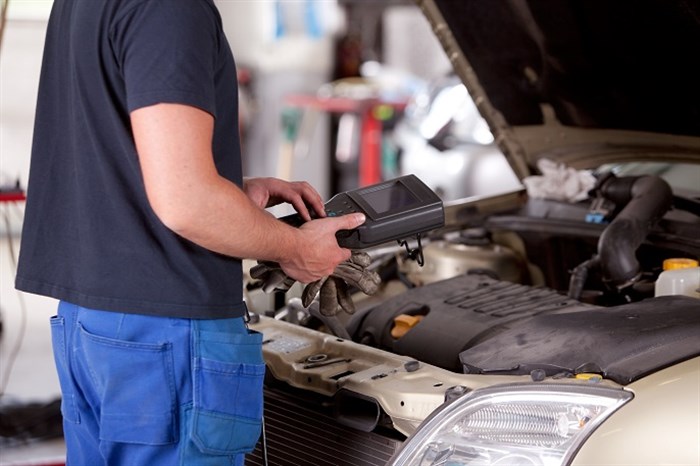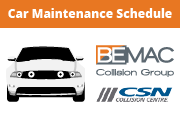
Whether you own a brand new model or a faithful old clunker, every driver needs a car tune-up from time to time. Proper maintenance will keep your vehicle operating safely and maximize fuel efficiency.
And if you notice any of the 4 warning signs listed below, don’t hesitate. A delay could lead to significant damage (which means costly repairs). Instead, bring your car in for a tune-up ASAP.
What Goes Into A Vehicle Tune-Up
Modern technology — like fuel injection and computerized onboard monitoring — has simplified routine automobile maintenance for newer cars.
However, there are still some critical issues that need regular attention. Here’s what should go into your Ottawa area car tune-up.
1. Change Of Oil & Other Fluids
Regular oil changes (every 5,000-7,000 kilometres) keep your engine cleaner so it will last longer. It’s a good idea to have the oil filter changed at the same time.
Other fluids that need occasional changing include brake fluid, engine coolant, power steering fluid, and transmission fluid. Intervals vary according to your car’s make and model, so check with us to find out when to schedule these changes.
2. Safety Inspection
When you buy a used car or register an out-of-province vehicle in Ontario for the first time, you’ll need to pass an inspection to get a Safety Standard Certificate. Bemac is licensed by the Ministry of Transportation to perform motor vehicle safety inspections. You can request a safety inspection any time you are concerned about your car’s safe performance.
3. Mechanical Repair
If your safety inspection turns up any issues like a side mirror not working, have Bemac take care of the mechanical repair on the spot. Our professional mechanics are experts at speedy, effective repair of car engines, brakes, exhaust systems, tires and wheels, and more.
Contact us to schedule your tune-up.
Warning Signs You Need a Tune-Up
1. The Dashboard Lights Come On
How many times have you seen one of the icons light up on your dashboard, and thought ‘it probably isn’t serious?’
You’re right – at that moment it isn’t serious. But it’s going to become serious quickly if you don’t get a car tune up. The warning lights are there to indicate that there is something wrong with your engine.
If you see any light flash on your dashboard that you don’t normally see, check your car’s owner manual to identify what the light means. Then call us to book an appointment for a tune up.
2. You Hear Unusual Noises
Drivers become attuned to the sounds their car makes on a regular basis. It can even be kind of soothing. But ease can quickly turn to panic when you hear a loud sound that was definitely not there the day before.
Unless you are a trained auto mechanic, it will be almost impossible to identify what the unusual noise means. Even then, the best thing to do is bring your car in for a tune up so that we can find the cause of the noise and hopefully prevent a much bigger problem down the road.
3. You Start Stalling Out
If you’re learning to drive a car with a manual transmission, stalls are going to happen. If you’re an experienced driver or have an automatic car and are still experiencing stalls, this is a sign that you could have a bigger problem.
Stalling is when your engine dies, and can be a scary experience. Some reasons your car could stall include:
- A dead battery
- A faulty fuel pump
- Ignition issues
- Improper release of the clutch on transmission vehicles.
All of these are issues that should be addressed right away. Our team of professionals will be able to help identify the problem and make sure that your car is in the best possible shape.
Tip: If you run into a problem that means you need to pull over, make sure your car emergency kit is fully stocked with all the essentials.
4. Bad Fuel Milage
We’re always trying to get as much fuel mileage as we can, and like to know how far our car can go on a tank of gas. Just think about all the conversations you’ve had about cars where one of the first questions you’re asked is ‘how’s the mileage?’
If you’ve been driving your car for a while, you’ll have a pretty good idea how far you can go on one tank of gas. The number should consistently be in the same range of numbers.
If you notice that you aren’t getting as much mileage on a tank of gas as you usually do, it’s worth bringing it into us for a thorough check and car tune up. There could be underlying problems contributing to the decrease in efficiency.
Tip: Keep track of your mileage by recording it each time you go to fill up the tank. Your mileage is automatically counted on your dashboard. Keep a book and pen in the car, and record each trip, then reset the counter. This will help you easily see how far you go on a tank of gas, and be able to identify any dips in efficiency.
5. Your Car Is Slow to Accelerate
Are you noticing that there is a little less get up in your go? Is it taking your car longer to react when the light turns from red to green?
A car that is slow to accelerate will usually signal a problem that has progressed over time, as we tend not to notice very slight changes until they all add up to a big change.
Slow acceleration can cause issues in situations when you need to increase your speed, for example when going up a hill or merging onto a highway. We recommend making an appointment with us if you notice a decrease in acceleration.
6. You Can Feel Unusual Vibrations
When you’re driving over rough roads, you can feel it through your steering wheel and the frame of your car. It’s not a pleasant sensation, that’s for sure! While it doesn’t feel good, it is totally normal – it’s your car reacting to the road surface.
What isn’t totally normal is for you car to start vibrating when you are on a smooth, paved road. This signals that there is an internal problem. Whether you only feel it at certain speeds, in the steering wheel, or it feels like the whole car could vibrate apart, it is a sign that you need to come see us.
7. Your Engine Is Misfiring
A misfire occurs when an engine cylinder, or cylinders, fail to give power to your car. You will notice a loss of power and a shaking sensation. If one cylinder is on the fritz, you may still be able to make it home slowly.
The more cylinders that misfire, the more power you lose. This means your car will hardly move, and the shaking will get much worse.
An engine misfire is a serious problem that needs immediate attention. Some causes of an engine misfire include:
- A faulty ignition
- A problem in the fuel system
- A defect in the engine
The best way to handle the situation is to book a car tune up immediately. An unattended misfiring problem could cause damage to your car and become a much more expensive problem.
8. Car Pulls To One Side
When your car keeps pulling to the left or right side as you’re driving, it’s annoying and dangerously distracting. Have a tune-up as soon as possible. You’ll need our mechanic to check out potential causes such as wheel misalignment, inconsistent air pressure in the tires, wear and tear on steering or suspension components, or (most hazardous of all) unevenly worn brakes.
9. Car Is Shaking
If your car starts shaking, you might blame it on an uneven road surface. But if it vibrates even on smoothly paved streets, your vehicle has an internal problem. You may notice the vibrations only at certain speeds or just in the steering wheel, or they might be so forceful that you feel like the whole car could vibrate apart. However strong the vibrations are, they’re a sign you need to come in for a tune-up fast.
10. Brakes Are Grinding
Think of grinding brakes as a cry for help. Ignoring it means putting your car (and everyone in it) at risk. Instead, bring your vehicle to one of our body shops for a tune-up. Our crew will expertly diagnose and repair the problem, whether it is due to a brake pad problem, worn rotor discs, or any other source.
11. Car Is Overheating
Here’s a scenario every driver dreads: Your car’s all packed for a trip to the cottage, but it starts overheating soon after you hit the road. Suddenly you have to shift from vacation mode to calling for an emergency tow.
Avoid this happening to you by scheduling regular tune-ups to check for all the problems that cause a car to overheat in the first place, like a broken thermostat, coolant issues, or a non-functional radiator or water pump.
Avoid These Problems With Regular Tune Ups
 Avoid these potentially expensive problems by getting your car on a regular maintenance schedule. We have a helpful infographic that clearly lays out a schedule for all the repairs and services your car needs and when it needs them.
Avoid these potentially expensive problems by getting your car on a regular maintenance schedule. We have a helpful infographic that clearly lays out a schedule for all the repairs and services your car needs and when it needs them.
Once you organize your schedule, we can help you execute it. We’ll give you a free quote on your requested service, and deliver top notch care from expert auto mechanics.








